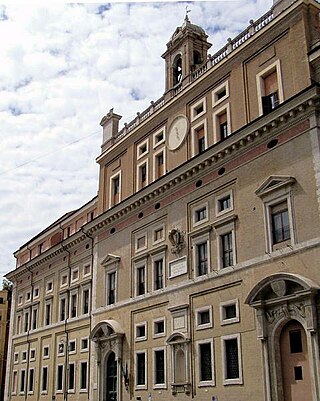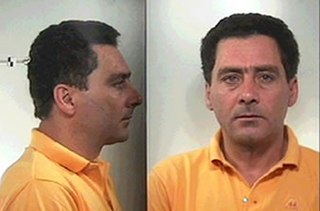
The South Tyrolean People's Party is a regionalist and mostly Christian-democratic political party in South Tyrol, an autonomous province with a German-speaking majority in northern Italy. Dieter Steger has been party leader since 2024, while party member Arno Kompatscher has been governor of South Tyrol since 2014.

Minister of the Interior is a prominent position in the Government of France. The position is equivalent to the interior minister in other countries, like the Home Secretary in the United Kingdom, the Minister of Public Safety in Canada, or the Minister of Home Affairs in Australia.

The Polizia di Stato is one of the national police forces of Italy. Alongside the Carabinieri, it is the main police force for providing police duties, primarily to cities and large towns, and with its child agencies it is also responsible for highway patrol (autostrade), railways (ferrovie), airports (aeroporti), customs, as well as certain waterways, and assisting the local police forces.

Law enforcement in Italy is centralized on a national level, carried out by multiple national forces, helped by few limited local agencies. The Italian law enforcement system is considered complex, with multiple police forces and other agencies taking part in different duties. Policing in the Italian system refers to the duties of "full-powered officers" coming from the four national main forces: Polizia di Stato, Carabinieri, Polizia Penitenziaria and Guardia di Finanza. While the duties of these four corps' include investigating and arresting, other local forces carry out limited duties.

The Nucleo Operativo Centrale di Sicurezza(NOCS) (English: Central Security Task Group) is the police tactical unit of the Polizia di Stato, one of Italy's national police forces. It operates under the command of the Direzione Centrale della Polizia di Prevenzione (English: Central Directorate for the Anti-Terrorism Police).
The General Investigations and Special Operations Division, generally known by its acronym DIGOS, is an Italian law enforcement agency charged with investigating sensitive cases involving terrorism, organized crime and serious offences such as kidnapping and extortion. It is a special operational division of Polizia di Stato, territorially organized within each provincial police headquarters. It is responsible to the national Central Police Directorate for Crime Prevention, which is a part of the Public Safety Department of the Interior Ministry. The DIGOS, which has an Office in each provincial headquarters, or Questura, of the Polizia di Stato acts as its Intelligence branch. Through "general investigations" aimed at having a constant eye on the evolution on national soil of social unrest, political underground movements and sports-related violent phenomena the DIGOS periodically reports to the Minister of Interior and to the Head of Police. Such activity is strongly assisted by the peculiar and specially trained infiltration units belonging to DIGOS that constantly enrich such reports and investigations with "inside views" of the various phenomena. Special training of such units involves classes on local slang, specific environment habits and social camouflage along with prior real-life experiences as a selection preference.

The Ministry of Defence is the government body of the Italian Republic responsible for military and civil defence matters and managing the Italian Armed Forces. It is led by the Italian Minister of Defence, a position occupied by Guido Crosetto since October 2022.

The Ministry of Culture is the ministry of the Government of Italy in charge of national museums and the monuments historiques. MiC's headquarters are located in the historic Collegio Romano Palace and the current Minister of Culture is Alessandro Giuli.

The Ministry of Enterprises and Made in Italy, commonly known under the shortening of its pre-2022 name, MISE, is a government ministry of the Italian Republic. It deals with production, economic activities, energy and mineral resources, telecommunications, consumers, tourism, internationalisation and business incentives. It was formed in 2006 after the reorganization of the Ministry of Productive Activities to which were merged the Ministry of Communications and the Ministry of International Trade in 2008.

Mario Caterino is an Italian Camorrista and member in the Casalesi clan from Casal di Principe in the province of Caserta between Naples and Salerno. He was on the "most wanted list" of the Italian ministry of the Interior since 2005, for murder and membership in the Camorra, until he was arrested on 2 May 2011 in Casal di Principe.

The Ministry of the Interior is a government agency of Italy, headquartered in Rome. It is a cabinet-level ministry of the Italian Republic. As of October 2022, Matteo Piantedosi, former Prefect of Rome, is the minister.
The 2008 Italian general election was the second in which Italian and dual citizens living outside the country could vote by postal ballot in international electoral districts. Twelve members of the Italian Chamber of Deputies and six members of the Italian Senate were elected in this way.

The Ministry of Economy and Finance, also known by the acronym MEF, is a ministry of the Italian government. Its responsibilities include overseeing economic policy, public investments and spending. The Ministry's headquarters are located in Rome's historic Palazzo delle Finanze. The current minister in the Meloni Cabinet is Giancarlo Giorgetti.

The Palazzo del Viminale is a historic palace in Rome (Italy), seat of the Prime Minister and of the Ministry of Interior since 1925; in 1961 the Prime Minister was transferred to Palazzo Chigi.
The Direzione Investigativa Antimafia (DIA), also known as the Anti-Mafia Investigation Division, is an Italian multi-force investigation body under the Department of Public Security of the Ministry of the Interior. Its main task is the fight against the mafia-related organized crime in Italy.

The Department for Civil Liberties and Immigration is a department of the Italian Ministry of Interior, with its headquarters in Rome, where the main Ministry of Interior offices are located, at the Palazzo del Viminale. The minister responsible is Luciana Lamorgese.

The 2020 Italian by-elections were called to fill seats in the Parliament that became vacant after the 2018 general elections. In 2020, by-elections were held for the Chamber of Deputies the Senate of the Republic.
The following is the structure of the Italian Navy as of June 2020. It is considered a multiregional and a blue-water navy.

The Ministry of the Navy was a ministry of the Kingdom of Italy from 1861 to 1946 and of the Italian Republic from 1946 to 1947. Under the Kingdom of Italy, it oversaw the Regia Marina, while under the Italian Republic, when its name became Ministero della marina militare, it oversaw the Marina Militare. The ministry was abolished in 1947, when it merged with the Ministry of Aeronautics and the Ministry of War to form the Ministry of Defence.

The Ministry of Aeronautics was a department of the Kingdom of Italy, and subsequently of the Italian Republic, with jurisdiction over both military and civil aviation. Established in 1925, it was abolished in 1947 when it merged with the Ministry of War and the Ministry of the Navy to form the Ministry of Defence.













